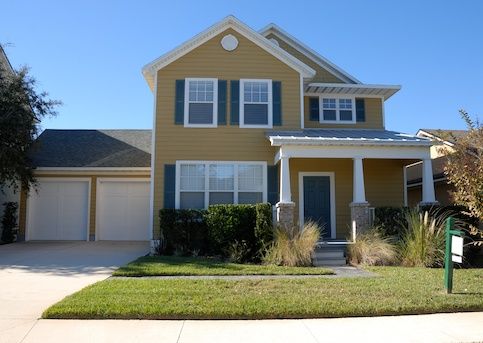Selling a house is not just a transaction; it’s a journey filled with anticipation, hope and, often, a touch of anxiety. It’s a chapter in your life where the past and the future intersect, and decisions made today can significantly impact your tomorrow. Whether you’re looking to upgrade to a larger space, downsize for retirement or embark on an adventure somewhere new, your timeline for selling is an essential piece of the plan.
If you’re in this situation, understanding how long it takes to sell a house is likely top of mind. While every home will be different, you can estimate the time it will take to sell your house, from listing to closing. It’s also helpful to know a few tips and strategies to streamline the process and avoid pitfalls that can delay your home sale by weeks or months.
Find A Mortgage Today and Lock In Your Rate!
Get matched with a lender that will work for your financial situation.
How Long Does It Take For A House To Sell?
On average, it takes 30 to 90 days to sell a home. However, timelines vary depending on your local market dynamics, home type and more. Home buyers can ask their real estate agent for insights on how quickly homes are moving or refer to websites for region-specific information.
See What You Qualify For
Home Purchase
Home Refinance
Tap Into Equity
What Affects How Long It Takes For A House To Sell?
Various factors affect how long it takes for a house to sell. Consider the following when putting your house up for sale.
What Kind Of Real Estate Market Is It?
A buyer’s market or seller’s market can affect how quickly a home sells. Specifically, a buyer’s market has an abundance of homes for sale but fewer buyers. This situation means buyers can be choosy during their home search. As a result, selling your home in a buyer’s market usually takes longer because you face more competition from other sellers. In addition, because buyers have the advantage, they often take their time making decisions and negotiating, leading to a longer selling timeline.
On the other hand, a seller’s market means a high demand for and low supply of homes, resulting in quicker sales and potentially higher selling prices. Buyers compete over scant property listings in this situation, leading to faster offers and closings.
When Do You Plan To List Your House?
The seasonal nature of the real estate market can affect how quickly homes sell. The late spring/early summer period is typically the best time to sell a house for many owners because buyers flock to the market during the warmer months. For example, buyers with families often choose May and June to move because of the timing of the school year. In addition, favorable weather makes moving easier.
Conversely, fall and winter months see less action in the real estate market. However, persistent buyers may choose these months to get a better deal.
Where Is Your Property Located?
Properties located in desirable locations typically sell faster. For instance, homebuyers usually want to live in areas with good schools, nearby amenities and low crime rates. Houses in neighborhoods lacking these qualities can take longer to sell and might require a lower asking price to appeal to buyers.
What Is The Condition Of Your House?
Well-maintained, clean homes are usually more attractive to buyers. Therefore, they often receive the lion’s share of attention from buyers, boosting sale prices and moving homes off the market quickly.
Remember, if your property needs significant repairs or updates, it may take longer to sell. Generally, buyers may hesitate or expect a lower price to account for the work needed. Even if you find a buyer specializing in fixer-uppers, they may offer below the asking price to maintain profitability.
How Is Your Home Priced?
Pricing your home competitively from the start can generate more interest and result in a quicker sale. In contrast, overpricing can deter buyers and lead to a longer time on the market. Numerous price changes and a lengthy “for sale” status can be a red flag for buyers. Therefore, it’s crucial to work with a real estate agent to set a suitable price on the first go and avoid mistakes.
If your home is on the market for an extended period without offers, you may be pricing yourself out of the market. In this scenario, reducing the price can attract new buyers and accelerate the sale.
Find A Mortgage Today and Lock In Your Rate!
Get matched with a lender that will work for your financial situation.
What Is The House Selling Process Timeline?
The home selling process has several stages. Here’s how long each takes and the total timeline for selling your house.
Listing And Showing
The home selling process begins with listing a home for sale and showing it to potential buyers. This first step requires you to choose between managing the listing yourself or hiring a real estate agent. Working with an agent is advisable because they provide guidance on pricing, marketing, legal requirements, and more. Plus, they work for commission, meaning they only receive payment when the house sells.
Remember, it’s essential to prepare your property before listing. For example, sellers should clean and declutter each room to show it at its best. In addition, minor upgrades and repairs, such as fixing a leaky faucet, can increase the home’s desirability. On average, it takes about a month to get a house ready to sell.
Next, you’ll set the listing price. Your agent will help you determine an appropriate listing price based on market research, comparable sales (known as comps) and the condition of your home.
Once your home is ready, your agent will create a listing with high-quality photos and compelling descriptions. An efficient agent can complete the staging, photography, and listing within 2 – 3 days. Then, your agent will market the property through various channels, including online listings, open houses and networking with other agents. Ideally, potential buyers will then request showings to view your property.
Accepting An Offer
If you receive an offer you like, you generally have time to negotiate on the particulars. For example, you could stipulate a 60-day period to vacate, meaning the buyer gives you 2 months to move out after closing. On average, buyers submit offers with a 48-hour expiration period. As a result, these negotiations usually take 2 days but can take longer if the buyer counteroffers and you struggle to reach an agreement.
Appraisals And Inspection
Once you accept an offer, the appraisal and inspection occur to inform the buyer about how much their lender will provide for the purchase and the condition of the home. Negotiations may reopen if the appraisal comes in lower than the purchase price.
The inspection takes place independently of the appraisal. A professional will assess the property’s condition. Specifically, they’ll evaluate the home’s structure, systems and environment to ascertain any issues with the home.
The appraisal and inspection typically take 8 – 10 days. However, buyers can shorten this timeline by forgoing the inspection. This practice isn’t recommended, but buyers sometimes do so in red-hot seller’s markets to edge out competitors.
Final Negotiations And Closing
Lastly, negotiations may resume if issues arise from the appraisal or inspection or if the buyer requests repairs or concessions. Both parties must agree on any changes to the contract.
In addition, the buyer will hire a title company to conduct a title search to ensure there are no liens or ownership disputes. Title searches typically take 1 – 2 weeks. The buyer also sets up an escrow account to hold funds until the closing process is complete.
If the title search comes back clear and there are no further negotiations, the buyer usually conducts a final walkthrough 1 – 2 days before closing. This way, they can personally ensure the property is in the agreed-upon condition.
Finally, the buyer and seller attend the closing. This is a formal meeting where both parties sign the necessary documents and ownership is transferred to the buyer. Funds are disbursed to the appropriate parties, including the seller, real estate agents and the title company. Closing usually takes a couple of hours. After closing, the buyer receives the keys, records the sale with the local government and becomes the new owner.
What Is The Timeline For Preparing To Sell A House?
Remember, listing and showing your home is only possible through careful planning and preparation. A homeowner has the most control over the variables – such as the home’s condition and the timing of the sale – before their home goes on the market. Arranging your home for listing has a timeline of its own, and managing these issues in advance affects how quickly a home may sell.
3 Months Before Listing And Showing
Here are the tasks a homeowner can complete 3 months before listing their house:
- Decide if you want to sell. First, it’s recommended that homeowners feel confident in their decision after considering all the details and ramifications of selling their house now. Overall, America is still experiencing a seller’s market, meaning real estate prices and demand are high. Listing your house now can mean quick movement and a profit. However, it’s critical for homeowners to understand their local market. For example, your region might move more slowly than the national market, reducing prices and extending timelines.
- Start looking for a new home. Selling your home isn’t feasible if you don’t have a place to live afterward. So, if you want to sell your house, it’s best to start searching for a new one without delay. Doing so means perusing listings and making offers ahead of listing your house.
- Choose a real estate agent. Finding the right real estate agent is vital to your journey as a buyer or seller in the real estate market. Interviewing multiple candidates allows you to choose one that meets your needs and understands your local market.
2 Months Before Listing And Showing
When you’re 2 months from listing, here’s what to focus on:
- Make any necessary repairs and improvements. Look at your home through a buyer’s discerning eye: are there missing roof shingles to replace? Do all your electrical sockets work? It’s unlikely that all the rooms in your house need renovation before selling, but every appliance should be in working order. In addition, the outside of your home should be welcoming and presentable.
- Determine your disclosures. Seller’s disclosures are mandatory for a home sale because they describe known issues with the property. Specifically, you’ll include repairs made and still needed, defects and threats to homeowner safety, missing essentials (such as a furnace), land-use limitations, HOA rules and deaths on the property.
1 Month Before Listing And Showing
When you’re 1 month away from listing and showing, here’s how to prepare:
- Clean and stage your home. Buyers can visualize themselves living in the home when it’s free of personal effects. So, clearing out your furniture and staging the home can increase the appeal to buyers and can help you raise your asking price.
- Have listing photos taken and set up a virtual tour. Buyers form first impressions through what they see of your house online. So, ask your agent to assist with professional photos and a virtual tour showcasing the property.
- Determine your asking price. Your agent can also help with setting your asking price. Factors such as current market conditions, sales of comparable homes and recent repairs or improvements will influence your asking price. In addition, a home appraisal beforehand can help inform you about the property’s worth, but you’ll have to pay out of pocket for one.
Once you’ve checked off this list, you’ll likely be ready to list your home for sale.
FAQs About How Long It Takes To Sell A Home
Answers for these frequently asked questions can clarify confusion you may have about how long it takes to sell a home.
What if it’s taking longer than expected to sell my house?
If your house isn’t selling as quickly as you expected, it’s crucial to diagnose the problem. For example, if you’re receiving offers but losing the buyer’s attention further in the process, the inspection and appraisal might assign a price tag beneath your initial asking price. In these types of situations, it’s best to consult with your agent to see if you can address any problems to make your listing more attractive.
What if I need to sell my house quickly?
A cash buyer can expedite your home sale because a lender isn’t involved, meaning the buyer can skip the appraisal and inspection. In addition, there’s no waiting for financing to come through. Likewise, you can include an appraisal guarantee in your contract with a typical buyer, meaning they’ll fill the gap between their initial offer and the appraisal to a specific dollar amount. This way, the appraisal won’t be a roadblock in negotiations, and you won’t lose money.
What if I sell my house before I can buy a new house?
The advantage to selling your house before buying a new one is that you don’t have any months where you’re paying two mortgages. However, you’ll need a plan in place before listing your home to prepare for this possibility. For example, you could put most of your possessions in a storage unit and live with a friend or family member or rent a place for a month. In addition, you’ll be under pressure to find a new home, even if it means paying more than you intended.
The Bottom Line
The timeline for selling a house can vary widely based on several factors. On average, selling a home takes approximately 30 – 90 days, but local market dynamics, property type and other considerations can influence this time frame. Understanding the factors affecting the selling timeline is essential for homeowners navigating the real estate market successfully.
Whether you’re looking for a quick sale or are willing to invest more time to get the best offer, working closely with a knowledgeable real estate agent can help you navigate the complexities of the real estate market and make informed decisions throughout the process.
Find A Mortgage Today and Lock In Your Rate!
Get matched with a lender that will work for your financial situation.

Ashley Kilroy
Ashley Kilroy is an experienced financial writer who writes for solo entrepreneurs as well as for Fortune 500 companies. She is a finance graduate of the University of Cincinnati. When Ashley isn’t helping people understand their finances, you may find her cage-diving with great whites or on safari in South Africa.











